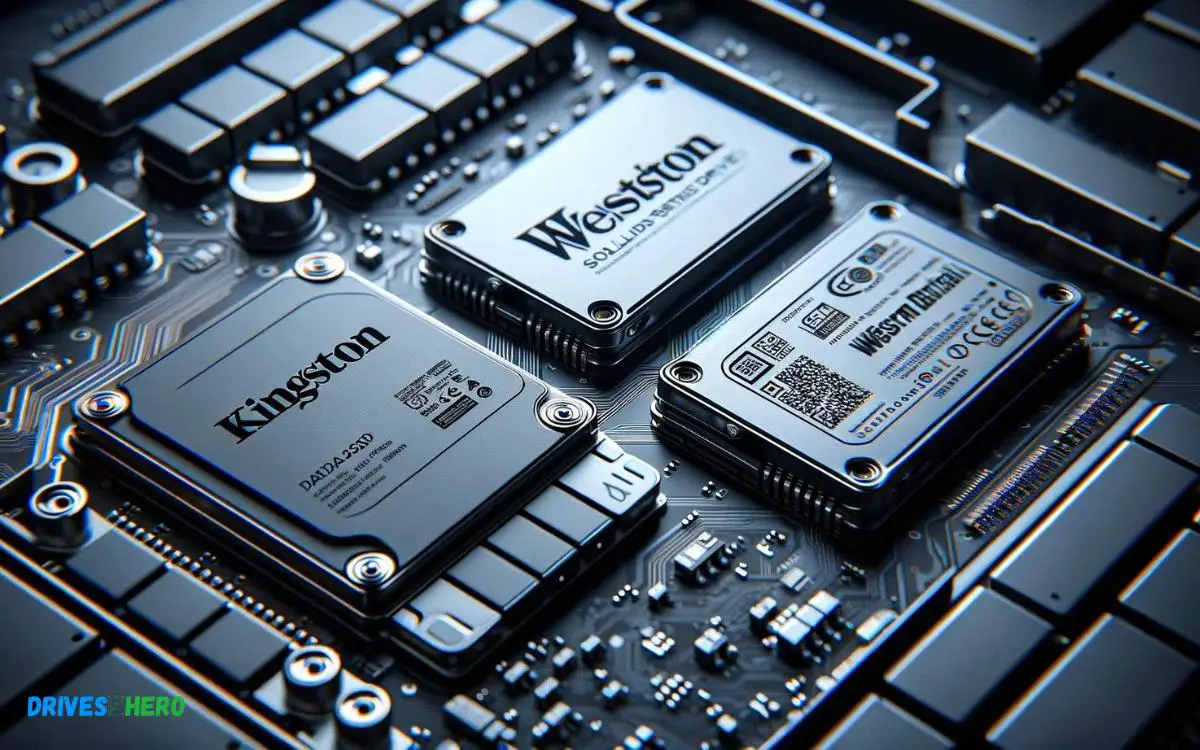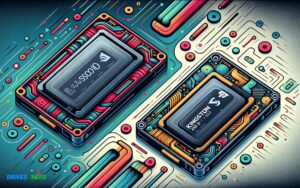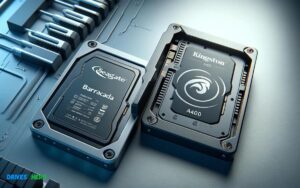Kingston Vs Western Digital Ssd: Which One Is Superior?
When comparing Kingston vs Western Digital (WD) SSDs, both brands offer reliable solid-state drives that enhance computer performance.
Kingston provides budget-friendly options with decent performance, while WD offers a range of SSDs including high-end models for demanding applications.
Choosing between Kingston and WD SSDs depends on your specific needs:
- Performance: WD has SSDs like the WD Black series that are tailored for gaming and high-intensity tasks. Kingston’s A400 series, on the other hand, is suitable for everyday use.
- Price: Kingston SSDs are generally more affordable, making them a good choice for budget builds or upgrades.
- Durability: Both brands have similar durability, but WD’s higher-end models may have better endurance ratings.
- Software and Warranty: WD offers a comprehensive software suite with cloning and backup tools, and their warranties can be more extensive. Kingston provides basic software support and competitive warranties as well.

Key Takeaway
Understanding Kingston Ssds
Delving into the world of solid-state drives, Kingston and Western Digital SSDs often lead the market debate. Each brand showcases unique benefits, with Kingston lauded for consistent performance and Western Digital favored for capacity options and reliability.
Kingston’s Product Range
Kingston has a comprehensive array of SSDs designed to meet diverse needs. From entry-level models perfect for day-to-day tasks to high-end solutions aimed at gaming and professional workloads, there is something for everyone.
The lineup includes:
- A Series – Designed for cost-effective performance upgrades from traditional hard drives.
- UV Series – Balanced performance for everyday computing needs.
- Fury – Specifically targeted at gamers seeking faster load times and smoother gameplay.
- DC Series – Enterprise-grade SSDs built for data centers with an emphasis on endurance and reliability.
Standout Features And Performance Metrics
| Feature | Description |
|---|---|
| 3D NAND Technology | Provides improved endurance and power efficiency compared to traditional 2D NAND. |
| Full-Security Suite | Offers hardware encryption and data protection capabilities for sensitive information. |
| Wear-Leveling Algorithm | Enhances reliability and prolongs the SSD’s lifespan by evenly distributing data writes. |
Exploring Western Digital Ssds
When debating the merits of SSDs, Western Digital emerges as a brand that’s synonymous with innovation and reliability in the data storage industry.
An analysis of their SSD offerings reveals a variety of products designed to meet the diverse needs of users, whether they’re casual consumers, avid gamers, or data center professionals.
This encapsulation focuses on understanding what sets Western Digital apart in the SSD market.
Western Digital’s Product Lineup
- WD Green™ SSDs – Ideal for everyday use in regular computing devices.
- WD Blue™ SSDs – Balances performance and reliability for content creators and multitaskers.
- WD Black™ SSDs – Tailored for gaming enthusiasts requiring exceptional performance.
- WD Red™ SSDs – Designed for NAS systems, providing endurance and reliability in 24/7 environments.
Noteworthy Characteristics And Performance Benchmarks
- 3D NAND Technology – Provides enhanced endurance and larger capacities.
- SATA and NVMe Interfaces – Offering options for both mainstream and high-speed PCIe throughput requirements.
- WD SSD Dashboard Software – For monitoring the health of the drive and available updates.
Benchmarks matter profoundly in illustrating the prowess of a storage solution.
Western Digital SSDs consistently show that more rows can be added as per the product range and performance data:
| Product | Sequential Read (up to) | Sequential Write (up to) | Random Read | Random Write |
|---|---|---|---|---|
| WD Black™ SN850 NVMe SSD | 7,000 MB/s | 5,300 MB/s | 1,000K IOPS | 720K IOPS |
| WD Blue™ SN550 NVMe SSD | 2,400 MB/s | 1,750 MB/s | 410K IOPS | 405K IOPS |
Whether it’s raw speed for gaming or consistent read and write operations for business applications, Western Digital’s broad spectrum of SSDs bring to the table a performance tailored to the user’s exact needs.
Kingston Vs Western Digital: Price-to-performance Ratio
When scouting for the best solid-state drive (SSD) for your computer, you’re likely to come across two prominent names in the market: Kingston and Western Digital (WD).
Choosing between these two giants isn’t just about the sticker price. Smart buyers know that the price-to-performance ratio is where the true value lies.
This crucial metric examines both the cost and capabilities of SSDs, ensuring you get the most speed and storage for your dollar.
- Determining which brand offers the best deal requires a look at their respective pricing models.
- Kingston SSDs are often favored for their competitive pricing, especially within the entry-level and mid-range markets.
- The company has a reputation for providing reliable storage solutions without a hefty price tag.
- On the other hand, Western Digital tends to span a wider pricing spectrum, offering both budget-friendly options and premium SSDs designed for high performance.
| SSD Model | Kingston | Western Digital |
|---|---|---|
| Entry-level 256GB | $40 | $45 |
| Mid-range 512GB | $60 | $70 |
| High-end 1TB | $110 | $120 |
Price aside, performance is the true battlefield. Benchmarking tests show that high-end Western Digital SSDs demonstrate a slight advantage in read/write speeds over their Kingston counterparts.
This difference is particularly notable in WD’s premium offerings, designed for gamers and professionals who demand ultra-fast data transfer rates.
- Sequential read speeds
- Sequential write speeds
- Random read/write operations per second (IOPS)
Making An Informed Decision
Seeking the optimal SSD for your computing needs requires weighing various factors, from performance to price. Two industry giants, Kingston and Western Digital (WD), often stand out in the search for reliable solid-state drives.
Key Considerations For Choosing Between Kingston And Western Digital Ssds
Before making a purchase, it is essential to analyze elements that determine SSD suitability:
- Performance: Look at read/write speeds, IOPS, and durability.
- Storage Capacity: Assess your storage needs against the available SSD sizes.
- Price: Balance your budget with the features you require.
- Reliability: Research the longevity and warranty periods offered.
- Compatibility: Ensure the SSD fits your system’s form factor and interface.
Final Thought: Which Ssd Suits Your Needs Best?
Determining the ideal SSD is contingent on individual requirements:
| Aspect | Kingston | Western Digital |
|---|---|---|
| Value Seekers | Favorable | Varies |
| Performance Enthusiasts | Competent | Superior |
| Professionals | Sufficient | Optimal |
Conclusion
Selecting the right SSD can be a game-changer for your computer’s performance. Between Kingston and Western Digital, both offer unique advantages. Your choice hinges on specific needs and budget constraints.
Ultimately, each brand promises to rejuvenate your system, ensuring a swift, reliable storage solution for tech enthusiasts and professionals alike. Choose wisely for an enhanced computing experience.






